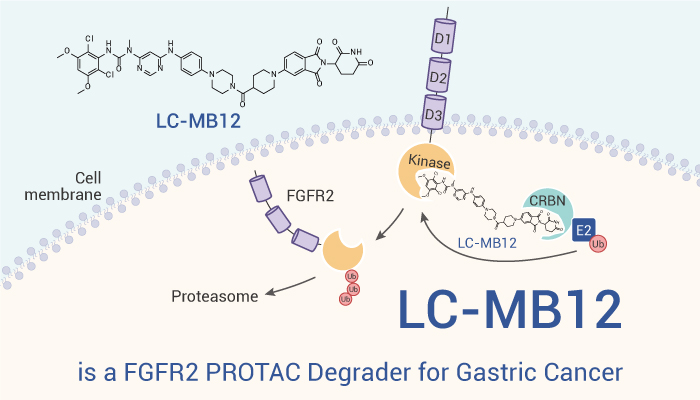Fibroblast growth factor receptor 2 (FGFR2) also known as CD332 (cluster of differentiation 332) is a protein that in humans is encoded by the FGFR2 gene residing on chromosome 10. FGFR2 is a receptor for fibroblast growth factor.
The protein encoded by this gene is a member of the fibroblast growth factor receptor family. And it amino acid sequence is highly conserved between members and throughout evolution. FGFR family members differ from one another in their ligand affinities and tissue distribution. A full-length representative protein consists of an extracellular region, composed of three immunoglobulin domains, a single hydrophobic membrane-spanning segment and a cytoplasmic tyrosine kinase domain. The extracellular portion of the protein interacts with fibroblast growth factors, then setting in motion a cascade of downstream signals, ultimately influencing mitogenesis and differentiation. This particular family member is a high-affinity receptor for acidic, basic and/or keratinocyte growth factor, depending on the isoform.
FGFR2 has important roles in embryonic development and tissue repair, especially bone and blood vessels. In addition, like the other members of the fibroblast growth factor receptor family, these receptors signal by binding to their ligand and dimerisation (pairing of receptors), which causes the tyrosine kinase domains to initiate a cascade of intracellular signals. On a molecular level these signals mediate cell division, growth and differentiation.

LC-MB12 is a FGFR2 inhibitor for Gastric Cancer Research
LC-MB12 is an orally active PROTAC compound targets FGFR2 degradation with a DC50 of 11.8 nM. And LC-MB12 contains BGJ398 (a FGFR2 inhibitor), PROTAC linker and CRBN. And it inhibits FGFR2 signaling in gastric cancer cells and has anti-tumor activity.
In vitro, LC-MB12 (0.5-10,000 nM, 3-12 hours) degrades FGFR2 in a time-dependent manner in KATO III, with a DC50 of 11.8 nM. LC-MB12 (100 nM, 6 hours) degrades FGFR2 to 77% in KATO III and 43% in NCI-H1581. What’s more, LC-MB12 (1-10000 nM, 72 hours) inhibits the growth of KATO III, SNU-16, and NCI-H716 significantly with IC50s of 29.1 nM, 3.7 nM and 3.2 nM, respectively, and induces KATO III G0/G1 phase arrest. In vivo, LC-MB12 (20 mg/kg/day, p.o., 15 days) inhibits tumor growth to 63.1% in SNU-16 xenograft models of nude mice. And it (20 mg/kg, p.o.) shows fast absorption (Cmax: 2.6 h) and orally bioavailable (F: 13%) in mice. Furthermore, LC-MB12 (20 mg/kg, p.o., 30 days) is well tolerated and has no apparent hepatotoxicity or nephrotoxicity in mice.
In conclusion, LC-MB12 is an orally active FGFR2 inhibitor for gastric cancer research.
Reference:
[1]. J Med Chem. 2023 Jun 8;66(11):7438-7453.
[2]. Expert Rev Clin Pharmacol. 2023 Jul-Dec;16(7):631-642.
